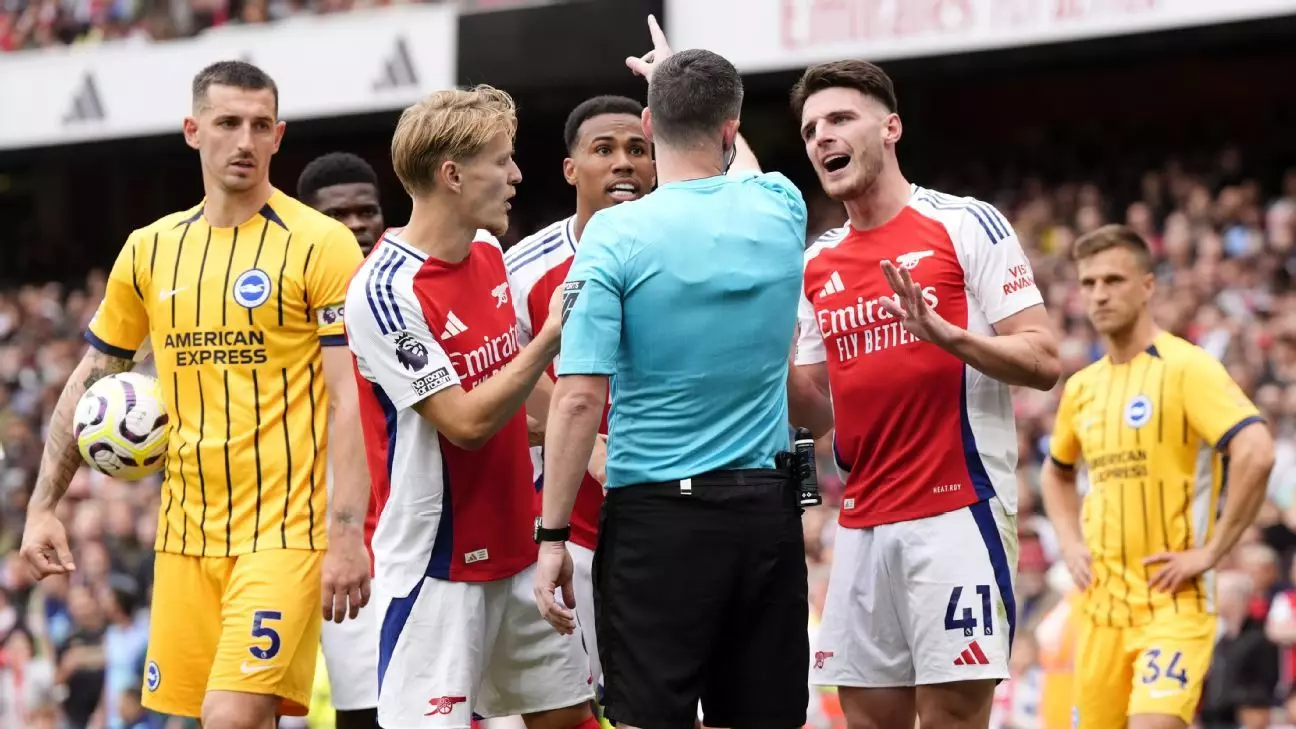The intricate world of professional football is filled with the drama of live events, from sensational goals to heated disputes, but none is as polarizing as the referee’s decision-making process. A recent incident involving Arsenal’s Declan Rice and Premier League referee Chris Kavanagh has reignited discussions about the nature of officiating and the systems in place to ensure fair play. This article aims to dissect this event while offering insights into the complexities and challenges faced by referees on the pitch.
In a Premier League clash against Brighton, Declan Rice found himself sent off after receiving a second yellow card for kicking the ball away. This seemingly straightforward incident led to an avalanche of commentary on the role of match officials. Referee Chris Kavanagh was clearly uncomfortable with the decision, stating, “I don’t like it,” as he explained the necessity of showing the card after Rice’s action perpetually interrupted the flow of the game.
What exacerbates the situation is that Rice was already on a yellow card. In the context of professional football, where every moment can shift the momentum of the game, the referee’s decisions can seem like a game of chess—strategic, calculating, and often fraught with pressure. With Kavanagh’s admission of discomfort, it’s clear that officiating is not merely about enforcing rules; it involves navigating the dynamic environment of a football match, where decisions can lead to intense scrutiny.
The audio released from the incident illustrates a fundamental aspect of officiating: communication. Kavanagh’s interactions with his assistant referees during the game highlight the collaborative nature of officiating at this level. The Premier League’s initiative to share these conversations aims to foster a better understanding of the decision-making processes. In a league where errors are frequently magnified, such transparency represents a significant step toward bridging the divide between fans and officials.
It’s worth noting the disparity in responses to similar actions during the game. Arsenal’s Mikel Arteta expressed his disbelief at the dissent shown towards Rice while pointing out that Brighton’s Joao Pedro escaped similar disciplinary action earlier in the match. Howard Webb, a former referee and now a central figure in officiating oversight, acknowledged that Pedro should have faced a caution. This highlights the inconsistency in officiating—issues that continue to undermine trust between players, managers, and referees.
One of the core issues in football officiating is the perceived inconsistency in enforcement of rules. Webb’s acknowledgment of the oversights during the match with respect to both players emphasizes the ongoing struggle for uniformity in applying the laws of the game. Without consistent policies and expectations, the legitimacy of officiating can come under fire, complicating the relationship between authority on the pitch and the players attempting to navigate the conditions.
As football evolves, with increased scrutiny from fans, players, and the media alike, the challenge becomes twofold: ensuring that the rulebook is adhered to while providing grace for the human element in officiating. Striking this balance is no small feat, as seen in Kavanagh’s predicament. His struggle encapsulates the sound reasoning behind pre-season directives aimed at players regarding conduct following whistle blows; such measures are deemed necessary to uphold the integrity of the sport.
The discussions surrounding the use of Video Assistant Referee (VAR) technology have sparked a significant debate within the football community. In another notable instance discussed following the Rice incident, a penalty awarded to Everton’s Dominic Calvert-Lewin was later overturned thanks to VAR intervention. This situation reflects one of the critical dilemmas facing modern football: while VAR purports to rectify referee errors, it also adds layers of complexity and potential disruption to matches.
Webb’s assessment that VAR could and should step in readily highlights the system’s dual nature—it aims to enhance decision-making but simultaneously removes the immediacy and fluidity that football fans crave. Each officiating incident that successfully utilizes VAR adds weight to its justification, while every mismanaged review casts doubt upon its efficacy.
The intricacies of officiating in professional football are a microcosm of broader societal issues regarding authority, accountability, and consistency. The incidents involving Declan Rice and others reflect the multifaceted challenges that referees face. As the Premier League takes progressive steps towards transparency through initiatives like “Match Officials Mic’d Up,” it is clear that fostering understanding is just as critical as improving decision-making protocols.
Ultimately, embracing a culture of dialogue between officials, players, and fans will be essential in shaping the future landscape of football officiating. Consistency, fairness, and innovation must coexist to preserve the sanctity of the sport and ensure that every match is decided on the pitch, not by controversy off it.

